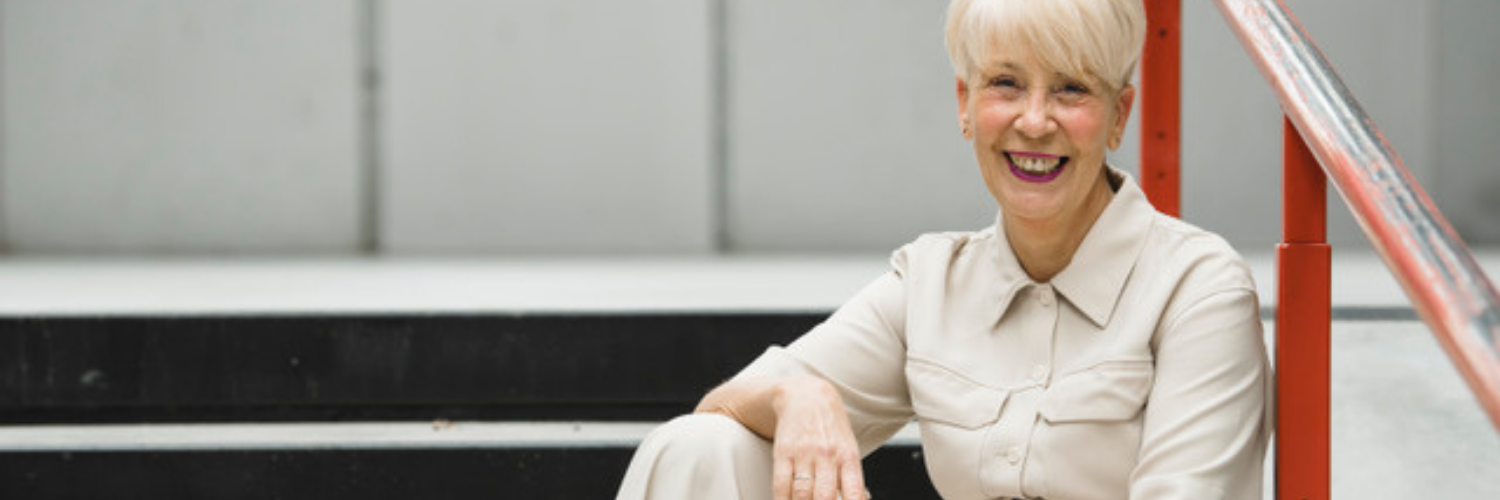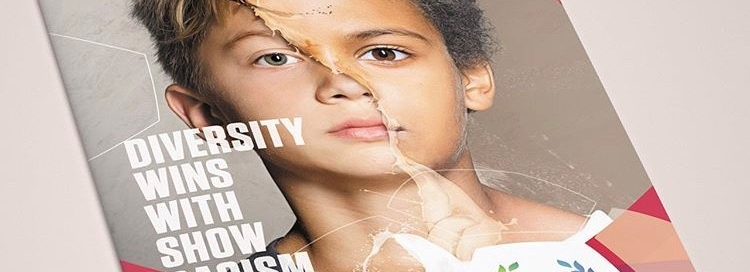Interview with Karin Blankenstein
09 February 2021
Karin Blankenstein is the president and the founder of the John Blankenstein Foundation. The Dutch foundation is committed to creating a safer and more inclusive environment for LGBTQ+ people in sports.
Karin is the sister of John Blankenstein, the first of only a few openly gay referees in football to this day. After his refereeing career, John meant to dedicate his life to the acceptance of LGBTQ+ people in sports, but he passed away in 2006.
Since then, Karin has picked up the baton. The Foundation was established in 2008 and has now multiple staff members and almost 20 volunteers.
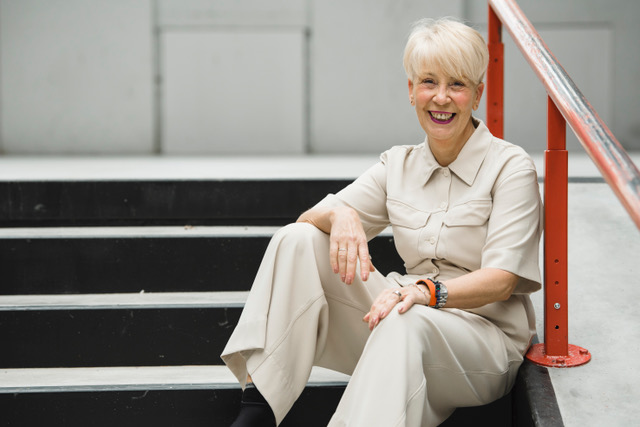
Karin, you set up the foundation in 2008. How does the John Blankenstein Foundation create a more inclusive environment for LGBTQ+ athletes?
Our core business is delivering workshops. We deliver workshops in all kinds of grassroots sports clubs, but also at sports academies and within sports federations. Furthermore, we work through lots of partnerships, for instance with local municipalities on their ‘sports agreements’. Often in the field of sports, municipalities are unsure how to deal with the subject of LGBTQ+, so that’s where we come in.
Furthermore, we have close partnerships with sports federations. For instance, we are in the Alliance Gelijkspelen 4.0 together with the Dutch Olypmic Committee and Sports Federation (NOC*NSF) the Dutch Football Association (KNVB), the Dutch Field Hockey Federation (KNHB), and the Foundation of Pink Football Fan Clubs (RVFC).
Where are the biggest challenges in achieving the goals of the John Blankenstein Foundation?
One of the biggest challenges is still working with sports associations. At first it was difficult to get into professional football organisations and to speak to them. But gradually, we are able to get a seat at the table at more and more football clubs and that want us to come and deliver workshops. Which is partly thanks to Michael van Praag, the former president of the Dutch Football Association.
Another big challenge is grassroots football, or grassroots sports in general. When speaking with them, most say; “of course, everyone is welcome at our club, but we just don’t have [gay members]”. That’s the first thing you need to address, which is not always easy. Perhaps sport clubs should turn the questions around.
‘Why do you think they are not there?’ Is it because of an unsafe environment, or an unsafe feeling? After all, one of the most used swearwords among young people is ‘homo’ or ‘gay’.
And as adolescent, who might just be coming to terms with themselves, that is something that can really put you off. Then they have to make a decision for themselves to either join the ‘locker room talk’ or quit playing. And that is the biggest challenge, really.
Fortunately, more and more sports associations are recognising the importance of inclusiveness. Not only in terms of cultural background, but also in terms of one’s sexual orientation or gender identity, or whether you have two fathers or two mothers.
Do you notice that the more professional clubs try to create an inclusive environment, the easier it gets to talk to grassroots clubs as well?
It certainly serves as an example. For instance, within municipal coalitions, if a professional club says LGBTQ+ acceptance is something they want to work on, the grassroots clubs say, ‘oh, this is something we should work on as well’. So, it certainly has a positive effect.
Where do you think are we in terms of general acceptance of LGBTQ+ people in football?
It’s getting better, but we’re not there yet. The main thing is that when something happens now, the media are more likely to talk about it. You also see this within grassroots clubs themselves. If there is an incident at a (grassroots) club, we notice that people no longer turn their heads away, but instead contact us and ask for advice or request workshops. This is something you didn’t see a few years ago. Of course, people don’t come to us in large numbers yet, but everything has to start small.
So, you notice that it’s a topic that is dared to talk about more and more?
Yes. We recently had a situation where a coach came to us for advice, because he was not really sure how to handle a situation. One player was the subject of bullying, because he had two mothers. The coach did not want to lose the players, but he also did not want to be the reason that the certain player was the subject of more bullying. New situations arise all the time, because people now dare to talk about it. For example, how to make the sport environment work for transgender people, as they are often feel even less safe in sports.
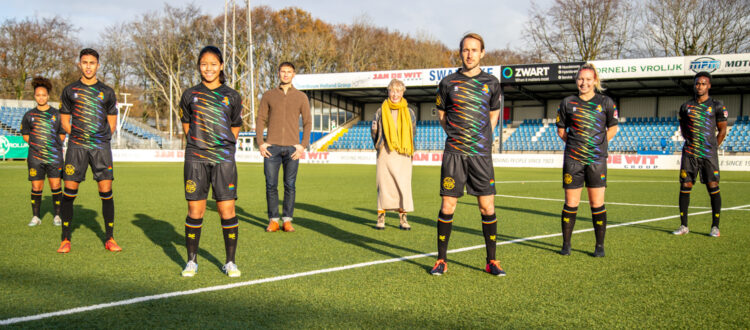
What are the next steps in addressing the challenges that there are in terms of LGBTQ+ acceptance in football?
It is important to take the subject seriously. Do not dismiss it because you think you don’t experience it in your club. The fact that you do not have gay footballers at your club, does not mean that they aren’t there.
As for professional football clubs, they are starting to take action, but there is a huge difference when you compare how clubs address racism versus homophobia. This inequality should not be there. Whether a chant is racist or homophobic, it’s equally bad. Clubs should really address them at the same level. This inequality is also something that for instance Jewish organisations notice in regard to anti-Semitic chants.
Now when there are chants that include racist slurs, everyone speaks up, which is fantastic. This is also because we see the pain of players and what it does to them. It’s something very visible. Just a month before we had a racist incident in the Dutch league in November 2019, there were homophobic chants at five (!) matches. Nobody heard about it, the media did not discuss it, nothing. While that same media is participating in the awareness-raising campaigns by using rainbow-coloured microphones. So, there are still a lot of gains to be made in terms of addressing that inequality. The next step is really to have actions instead of words.
It’s great to have all kinds of action plans, but sometimes you need to take harsh decisions and pause or abandon a game to address the severity of the issue. We shouldn’t have to wait to act until we see a player that is visibly impacted by homophobic slurs.
Last year the fight against racism has been in the news quite a lot, does this help to address homophobia as well?
As I mentioned, we see that the fight against homophobia lags behind. Of course, COVID-19 had a huge impact on our activities as well, so time is not on our side. But the topic of LGBTQ+ is still ‘laughed about’. It’s not taken seriously, because ‘they’re’ not there, or because gay players drop out. What you see is that people often still perpetuate the stereotype of ‘they’re not footballers, they’re more feminine and do not like football’ et cetera. And because this ‘idea’ is so persistent, it makes it difficult to address.
In terms of LGBTQ+ acceptance and openly gay players, there is a huge difference between women’s and men’s football. Why do you think this is less of an issue in women’s football?
I wonder about that too. Perhaps because women look at each other differently? For example, when we deliver our workshops, if we bring up this subject with boys, they say things like; “I’m not going to play with him anymore, because I have to take a shower with him and then he ‘looks’ at me.” I think women look at it a little differently. For instance, we give workshops at field hockey clubs, we do them with boys and girls together. You notice that girls talk about it in a very different way than boys do.
Also, from my own experience playing football, which was a while ago – laughs, – it was never an issue if they were lesbians or a couple, or whatsoever. I don’t think it’s very different now.
To what extend would it help the acceptance of LGBTQ+ people, if a high-profile footballer came out as gay during his career? And why hasn’t anyone yet?
Of course, it would help. I know this from my brother, but within the footballing community, players know each other, so I would assume it wouldn’t something secretive within teams. And there’s always stories about the possible abuse of spectators, but there’s pretty much always been abusive or negative chants in the stadiums. And if you really are supported by your family, club and team, this is something you will get through.
We sometimes jokingly say, “now is the best time to come out, because there are not people in the stadium”. However, there will be a lot of media attention, so you have to be prepared for that. It would be nice if you could do it together with multiple players at the same time. Then you could say something like, ‘if you want to do an interview, it has to be with the three of us’, or something like that. So yeah, in terms of setting an example, it would mean a lot. It would certainly be very nice for younger players who have the same struggle.
However, it is important to note that this is a personal decision. The John Blankenstein Foundation is not there to ‘pull players out of the closet’. We are just aiming for an environment where players should not have to make that choice anymore. The nice thing would be that if you are ready, you can tell your club, without anyone falling over you or being difficult. Which then allows you to grow into the professional footballer, because if you want to make it, mentally you also need to be in a ‘good place’. For example, John, my brother, came out at the age of 17, so before he started his professional career. So, in that regard, they were never able to ‘touch’ him.
On the other hand, it should be noted that if you come out now, it has consequences as well. We cannot deny that it might close certain doors in your career, for instance, not being able to play in certain countries.
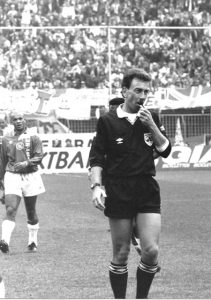
In December 2020, you organised a LGBTQ+ awareness raising campaign, do you notice that football clubs are really wanting to engage more?
For sure. In the beginning the campaign consisted of wearing a rainbow-coloured captain’s armband and it was just an initiative of the John Blankenstein Foundation and the VVCS (the players union). And this year, all most all parties were involved, both Leagues, the Federation, the referee association, the broadcasting channel, etc. It is really growing, there is media attention and there are a lot of positive responses. One club, Telstar played in a special rainbow kit. Even though they might be a smaller club, but you see that other clubs are thinking, ‘oh this is cool and something we should also do’.
Often, we ‘liberals’ in the Netherlands think that we are ahead, but we are in fact behind. For instance, if you look at Germany two weeks ago. To be honest, it has been a lot of work and a huge struggle to get the clubs in the Netherlands involved. I feel it’s less of a struggle in other countries to get clubs involved, so we have to do a lot more in the Netherlands.
We notice it’s also something supporters start to engage with. During the December campaign, I drove with someone from the LGBTQ+ fan club of ADO Den Haag to Emmen for the game FC Emmen – ADO Den Haag, because they were going to display a banner. That weekend we saw that fans of a different club had also made a banner after a spontaneous initiative. Fans clubs are engaging with it on their own initiative as well, which is so great.
So far, we only have one LGBTQ+ fan club, de Roze Régâhs, of ADO Den Haag. Would this help if there were more ‘pink fan groups’ in the Netherlands, like in Germany and the UK?
As for ADO Den Haag, the idea came from a group of friends that had known each other for a while and wanted to set up something like this. You notice that it is difficult to organise, maybe because there is no need, or because the fan culture in the Netherlands is different than, for instance, in Germany or England. In Germany the fan clubs are really involved in society. But yeah, it would be certainly interesting to look at.
As the John Blankenstein Foundation, do you meet with supporters’ groups and fan clubs?
That was on our agenda for this year. We are aiming to get people from different supporters’ collective at the table, just to have a chat and share stories and experiences. Not to be like ‘your chants are wrong’, but just to have a dialogue. Why do you use those chants? Do you consider the impact it might have on others? Questions like that. Unfortunately, with COVID19, this has been on pause for a bit.
What would your advice be for anyone who wants to take a stand against homophobia and promote LGBTQ+ acceptance in football?
Make sure there are enough children who feel safe in football environment and that no one drops out. For instance, if there is a father and son in the stands who belong to the LGBTQ+ community, that they do not stop coming to the stadium because of homophobic slurs. Because is that what you want? Of course, football is an experience, but there are so many other fun things to chant in a stadium. An excellent example is this Jewish woman, who had been in a concentration camp. She engaged in dialogue with a number of hardcore Feyenoord [Rotterdam] fans about the chants they use when playing Ajax. By listening to the stories of the woman, the fans realised that their chants were unacceptable.
Therefore, it’s important that as a fan you realise that people can be affected by your words. Even within the team you support, there could be someone you hurt. The player could have a brother, like me, in which case it hurts too. If you use homophobic slurs, you ‘touch’ my big brother, so why say these things?
No one wants to be called names or be discriminated against, so talk to each other about it, stand up to unacceptable behaviour. Of course, this can be really difficult within hard core supporters’ groups, but you have to start somewhere.

